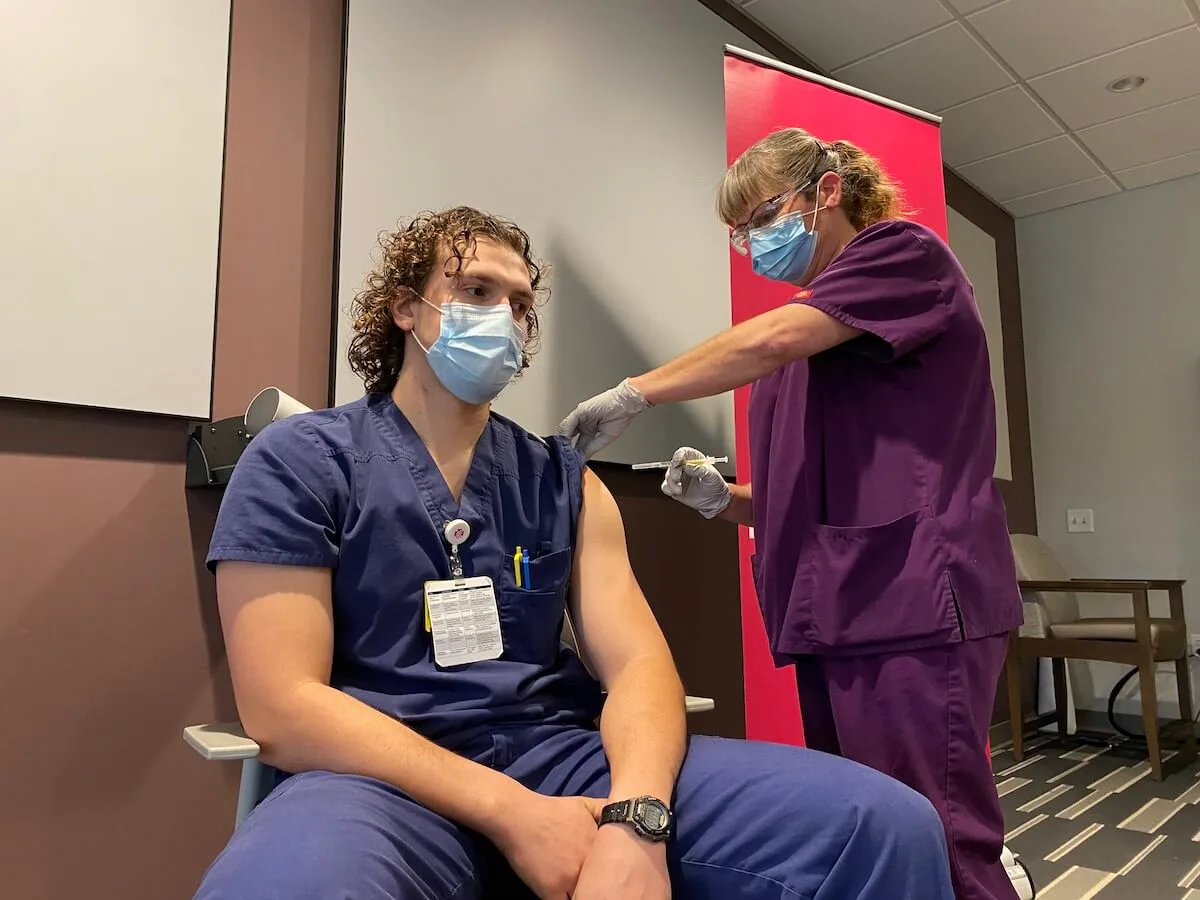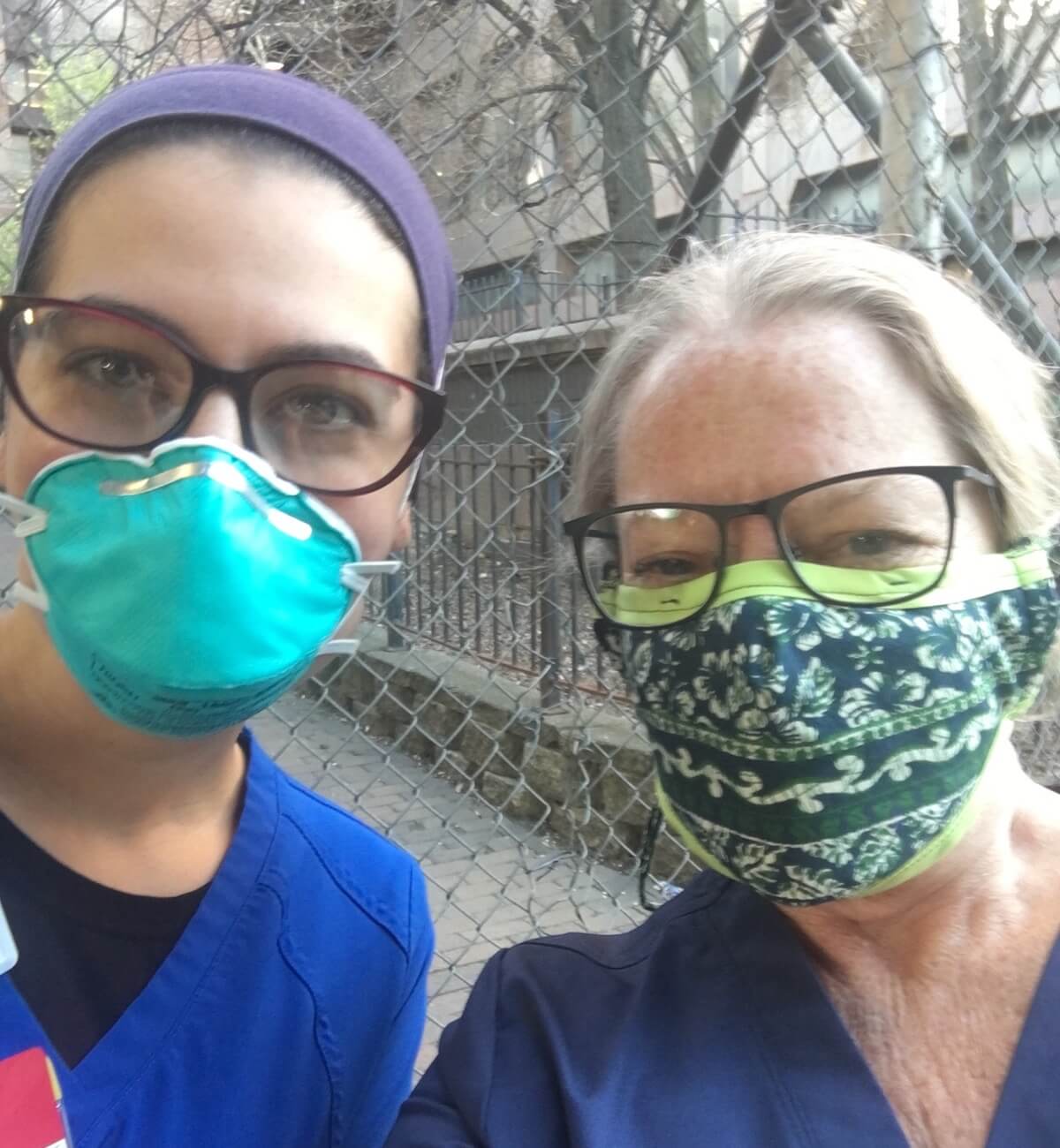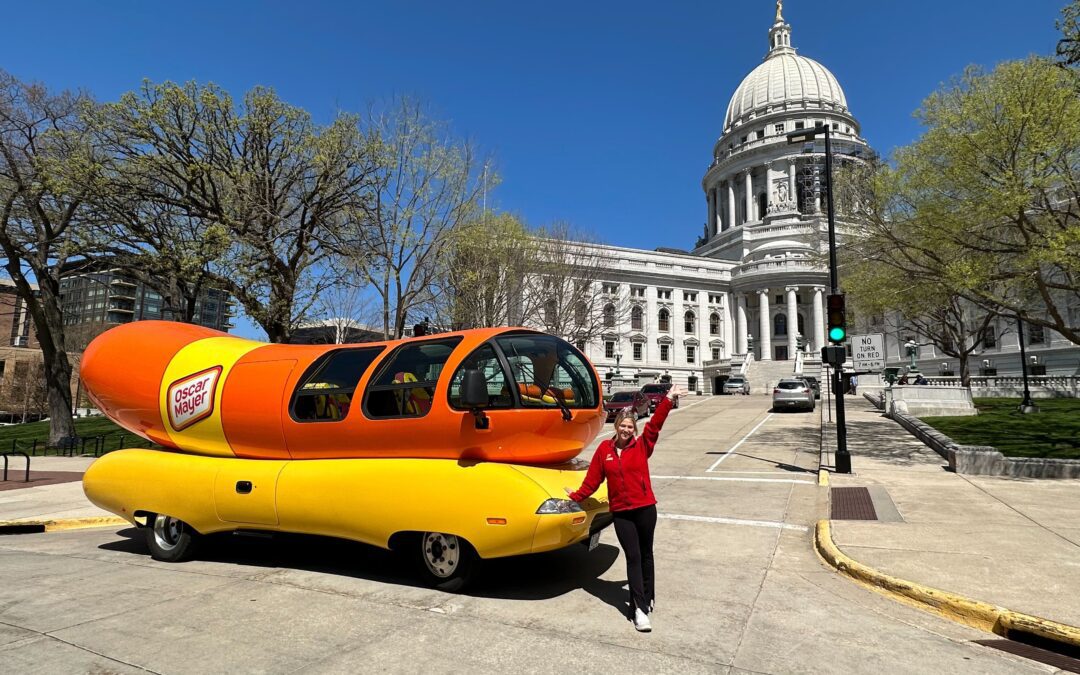
#image_title
Moderna vaccine won’t need super-cold storage, but Pfizer’s is also getting distributed statewide despite Republican politicians’ stated concerns.
When she heard COVID-19 vaccinations would be available this week at the Cumberland Healthcare hospital where she works, Elizabeth “Buffy” Riley didn’t need to be told to sign up.
The 62-year-old discharge planner and case manager at the hospital had worked in an intensive care unit in New York City for three weeks in April when that city was that nation’s coronavirus hotspot and was featured in multiple UpNorthNews stories about her trip.
The Brooklyn hospital where she was stationed was overwhelmed with people severely ill with COVID-19. Riley and other nurses scrambled between patients on ventilators, doing all they could to keep them alive. But often it wasn’t enough, and dead bodies stacked up faster than they could be removed.
While there Riley contracted COVID-19, and when she returned home she spent a night in the hospital when her breathing became labored. The virus caused her health complications. She was unable to return to work until June, and among her months-long symptoms was leg pain and weakness that made it difficult to walk at times, an issue that didn’t dissipate until the end of October.
So when Riley and other Cumberland Healthcare employees had the opportunity to sign up for the COVID-19 vaccine developed by Pfizer and its German partner BioN-Tech, she jumped at the opportunity. She received the vaccine on Wednesday, the first day it was available there.
“After all I’ve seen other patients go through, and after what I went through myself, I am grateful for any protection against the virus that I can get,” Riley said Friday morning on her way to work another shift at the hospital.
Healthcare workers in Cumberland, a city of 2,500 in Barron County in northwest Wisconsin, and other rural parts of the state are receiving the COVID-19 vaccine along with their counterparts in large communities such as Milwaukee and Madison, where the first coronavirus vaccination occurred Monday. Hospitals across northern and western parts of the state report receiving the vaccine as well.
The vaccine was made available after the US Food and Drug Administration (FDA) last week granted emergency use authorization of the Pfizer and BioN-Tech vaccine. Healthcare employees and residents and staff at long-term care facilities are the first to receive the vaccine, which is projected to be available to the general public as soon as the spring.
All seven of Wisconsin’s Healthcare Emergency Readiness Coalition regions have designated storage facilities to store the Pfizer vaccine, DHS Deputy Secretary Julie Willems Van Dijk said, ensuring the vaccine is available at rural healthcare sites.
That widespread distribution would appear to counter the concerns expressed a week ago by legislative Republicans who have been insisting on oversight that includes politicians on the Joint Finance Committee.
Rep. Mark Born (R-Beaver Dam), co-chair of the Legislature’s Joint Finance Committee, told WISN-TV’s UpFront, that rural access was the primary reason.
“We just want to make sure that there’s access across the state, as widespread as it can be,” Born said. “So folks in our assembly districts don’t have to drive long distances to large cities to access it.”
Assembly Minority Leader Gordon Hintz (D-Oshkosh) said on the same program last week that the proposal was “dangerous.”
“We don’t need this to be politicized or micromanaged by politicians, some of whom don’t even believe in vaccination,” Hintz said. “We need to let [DHS officials] do their job, and this is too serious and too important to getting our state back on track to allow this kind of politicized process.”
Bill Priest, chief administrative officer at Marshfield Medical Center-Eau Claire, said he is optimistic rural healthcare providers will continue to receive COVID-19 vaccinations. Marshfield has hospitals and clinics in rural regions across northern Wisconsin.
“It looks like the state has been judicious in getting this vaccine out there, and I am optimistic that it will continue that way,” Priest told UpNorthNews Friday.
State health officials said they have received about 50,000 doses from Pfizer this week, and could obtain as many as 100,000 doses of another coronavirus vaccine produced by Moderna. The Moderna vaccine appears to be ready for approval by the FDA.
Because it must be stored at extremely low temperatures–colder than minus-94 degrees Fahrenheit–the Pfizer vaccine is being stored at regional hubs, then distributed to smaller clinics and vaccination sites, health officials said. The Moderna vaccine does not require such cold storage and could be delivered more directly to healthcare providers, making it more readily available to rural areas, they said.

In addition to protecting against the deadly virus, the coronavirus vaccinations of healthcare workers at hospitals from Milwaukee to Green Bay to Eau Claire to Superior provides another much-needed commodity in hospitals these days: Hope.
Jacob Luttropp, a registered nurse at Marshfield Medical Center-Eau Claire who works in the hospital’s intensive care unit, was the first medical worker at that location to receive the vaccine when he did so Friday morning. After dealing with so many patient deaths and illnesses related to COVID-19 in recent months, healthcare workers’ spirits are boosted by the vaccine, he said.
“It has definitely impacted the mentality of our co-workers, that they’re looking forward, that we could potentially beat COVID, and this is a big step toward that,” he said.
Luttropp and Riley acknowledge there are concerns about the vaccine based in efficacy, or politics, or how quickly it was developed, but they trust the opportunity to halt an illness that has forced them to watch so many patients die.
“Look at your loved ones and ask yourself if you are willing to take a step forward to protect them,” Luttrop said. “I truly feel like this vaccine is taking that step forward to protect them.”
Riley lives in Hayward, in northern Wisconsin that votes heavily Republican in elections. Many in the region oppose wearing face masks and other practices to slow COVID-19 spread. But she is heartened by the fact so many of her fellow healthcare workers are being vaccinated and hopes it is a sign that many others in the community will do the same.
“Vaccinations are the best hope we have for getting this virus under control,” she said. “We just need enough people who are willing to do it.”

New Biden rules deliver automatic cash refunds for canceled flights, ban surprise fees
In the aftermath of a canceled or delayed flight, there’s nothing less appealing than spending hours on the phone waiting to speak with an airline...

One year on the Wienermobile: The life of a Wisconsin hotdogger
20,000+ miles. 16 states. 40+ cities. 12 months. Hotdogger Samantha Benish has been hard at work since graduating from the University of...

Biden makes 4 million more workers eligible for overtime pay
The Biden administration announced a new rule Tuesday to expand overtime pay for around 4 million lower-paid salaried employees nationwide. The...

‘Radical’ Republican proposals threaten bipartisan farm bill, USDA Secretary says
In an appearance before the North American Agricultural Journalists last week, United States Department of Agriculture (USDA) Secretary Tom Vilsack...




